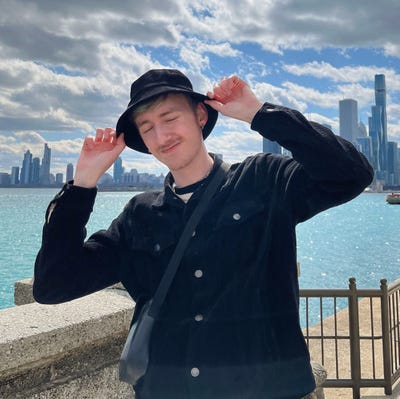From Waste Bins to Dinner Plates: Kelly Haggerty Fights Food Waste in New Orleans
Kelly Haggerty is a 26-year-old young professional proving the power of food waste in New Orleans. Beginning a branch of Food Rescue US in New Orleans, Haggerty has worked on several reputable projects to raise funds, spread knowledge, and perhaps largest of all; redirect hundreds of thousands of meals from waste bins to dinner plates.

Kelly Haggerty is a 26-year-old young professional proving the power of food waste in New Orleans. The master's degree holder took the knowledge acquired while preparing her thesis research project and turned it into a full-scale food waste recovery project capable of feeling thousands. Beginning a branch of Food Rescue US in New Orleans, Haggerty has worked on several reputable projects to raise funds, spread knowledge, and perhaps largest of all; redirect hundreds of thousands of meals from waste bins to dinner plates.
The Waste360 40 Under 40 award winner describes the important work she has done in New Orleans creating a stream of excess foods from the restaurant industry to people in need. Here’s a look into the process of re-establishing a New Orleans branch of the nationwide organization Food Rescue US and how her heavy hand in the development and functioning process has impacted community members.
Waste360 Staff: Can you tell us about Food Rescue US and how it works?
Haggerty: The model is basically a direct transfer of a food surplus from food serving businesses like restaurants, cafes, and bakeries, that is then redistributed to hunger relief organizations. Faith-based organizations or shelters are examples of some of the feeding organizations we distribute to. We function by using a software to connect volunteers to these dropouts for “food rescues” which is just getting excess food from point A to point B. You can access that software through foodrescue.us, which is our website.
Waste360 Staff: How large is the organization?
Haggerty: In total, we work with about 50 food donators, 24 food relief agencies that receive food from us, and 123 people who go out and collect the food.
Waste360 Staff: Can you tell us what the process of establishing Food Rescue US - New Orleans was like?
Haggerty: I was attending Louisiana State University and working on getting a Master of Science in Geography and Anthropology, and I was writing my thesis between 2017 and 2019 about food waste management in New Orleans. My thesis was published in May of 2019. A lot of my background work and research was about some of the organizations that had already existed here or were existing while I was working on it. When I began my research I noticed that Food Rescue US was here before in a very light capacity. I reached out to them to see if they were interested in coming back—and they were. Then we finally launched it again in 2020 together.
Waste360 Staff: How has your position and work changed throughout your time with the organization?
Haggerty: I've always been the site director, which is the person that manages the grounds and does the volunteer coordinating, outreach, onboarding—basically managing the software that we use to get volunteers on board. But in terms of how things have changed socioeconomically, now is very different from then. When we started in May of 2020 it was the most confusing part of the pandemic. No one had any idea what the future held for us, especially in terms of the restaurant industry and public health. There were a lot of mutual aid organizations that did a lot of work in 2020 into the beginning of 2021, and a lot of our work in the first year was really centered around disaster response of the pandemic.
We've always kept to the model of rescuing food surplus being redistributed to hunger relief organizations and I've always stuck to my same role. But the things that have changed are what’s going on around us. In early 2020 we were doing a lot of disaster response work and now we're back at picking up from restaurants, cafes, and bakeries for redistributing to hunger relief organizations.
Waste360: Can you pinpoint one experience that stands out to you as your biggest accomplishment?
Haggerty: Yes—when hurricane Laura came through. The storm came through the Lake Charles area, which is the southwest part of Louisiana. There were about 10,000 people who were living in downtown New Orleans hotels as displaced people and the Red Cross came in to help manage. They set up a food program that served breakfast, lunch, and dinner for those in each of the 30 downtown hotels for about two months. They assumed each hotel was housing about 300 displaced people. Really only about 30% of that food was being consumed. That means if 300 meals got dropped off at the Marriott for breakfast, then roughly 200 were getting thrown away per meal.
We quickly set up a program to rescue all of those meals. At times we rescued over 1,500 meals a day, especially as things wrapped up and people were able to return to their homes. Due to our work, there was a lot less food going to waste than there would have been, so I see that as a huge accomplishment.
Waste360: Is there a favorite project of yours that you would like to share with us?
Haggerty: There was this one fun thing we did in December of 2020 where someone from Soul NOLA, which is a tree planting company, reached out and asked us to take on a cleaning project for an orchard. We were able to get 25 volunteers out and we cleaned over about 1,500 pounds of citrus fruit; whether it was oranges, kumquats, or tangerines. That was a really fun project because it was on the note of making sure that food didn't go to waste, but we were out there working hands-on to collect the food that wound up being redistributed to about five different hunger relief organizations.
Waste360: Are there any other organizations you’re involved with?
Haggerty: Yes! I started a garden in the 7th Ward called the Enchanted Yam Garden, and the main project there is collecting residential food scraps for composting.
The garden is in collaboration with another organization called Compost Now designed to help residents find places to compost their food—whether it's at libraries or community gardens—and I put out a bin each week that residents can come to and drop off their compost to be processed at the garden.
Waste360: Last but not least, how does it feel to receive the 40 Under 40 award?
Haggerty: I feel very grateful, honored, and seen. I've been doing this work in various forms since 2017, and that's not necessarily a super long time, but I wrote a 175-page, 6-chapter thesis about food waste management in New Orleans and while that work seems so unbelievably significant to me, it's really just sitting on a dusty shelf. That thesis means so much to me, the work that I did in my master's program means so much to me—I think about it all the time—and it's truly carried over to this organization. So most people who I know and interact with here in New Orleans know me as the face of Food Rescue US - New Orleans, but it all started with that thesis; that project that I did on garbage in the city and food scraps. And so, I feel very seen. I feel like my entire body of work leading me to Food Rescue US is being seen and appreciated.
About the Author
You May Also Like




